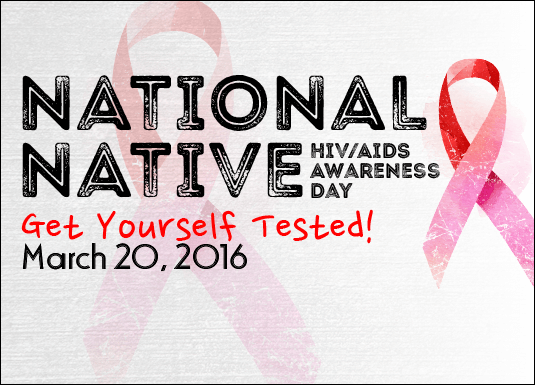National Native HIV/AIDS Awareness Day – Get Yourself Tested!
March 20, 2016
March 20, 2016, is National Native HIV/AIDS Awareness Day. This day is an opportunity for Native people across the United States to learn about HIV and AIDS, encourage HIV counseling and testing in Native communities, and help decrease the stigma associated with HIV/AIDS.
 On March 20, we recognize the impact of HIV and AIDS on American Indians, Alaska Natives, and Native Hawaiians (collectively referred to as Native people) through the observance of National Native HIV/AIDS Awareness Day. This national observance, now in its 9th year, is our opportunity to raise awareness of the risks of HIV to Native people, help communities understand what contributes to those risks, and encourage people to get tested for HIV.
On March 20, we recognize the impact of HIV and AIDS on American Indians, Alaska Natives, and Native Hawaiians (collectively referred to as Native people) through the observance of National Native HIV/AIDS Awareness Day. This national observance, now in its 9th year, is our opportunity to raise awareness of the risks of HIV to Native people, help communities understand what contributes to those risks, and encourage people to get tested for HIV.
Overall, approximately 14% of the 1.2 million Americans with HIV do not know they are infected. Among American Indian/Alaska Natives this figure is 19%, and among Native Hawaiians and other Pacific Islanders, the figure is 25%.1 CDC recommends that all adults and adolescents get tested for HIV at least once as a routine part of medical care, while those at increased risk should get an HIV test at least every year. Sexually active gay, bisexual, and other men who have sex with men (MSM) might benefit from HIV testing every 3 to 6 months. Women should get an HIV test each time they are pregnant.
HIV is a serious public health concern for Native people. Specific HIV prevention challenges, including poverty, culturally based stigma and high rates of sexually transmitted infections (STI).Stigma associated with gay relationships and HIV, barriers to mental health care, and high rates of drug and alcohol abuse, STIs, and poverty all increase the risk of HIV in Native communities and create obstacles to HIV prevention and awareness, encouraging HIV testing and promoting entry into medical care.
In observance of National Native HIV/AIDS Awareness Day, March 19th and 20th at the Winter’s End Pow Wow being held at the Crandon High School, a display with information and chances to win prizes will be available to stop and visit.
If you are interested in getting tested or have questions, please contact your primary care provider or contact Leah Littleton, CHR and Tribal HIV Coordinator in the FCP Community Health Department at 715-478-4381.
References
- Centers for Disease Control and Prevention. Monitoring selected national HIV prevention care objectives by using surveillance data- United States and six dependent areas-2012. Hiv Surveillance Supplemental Report 2014; 19 (No. 3)


